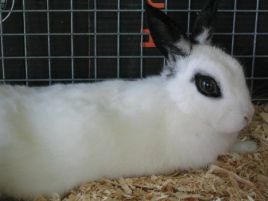How to provide the proper dental care for your rabbit
A few years ago I had the opportunity to participate in a "Lunch and Learn" session at Belle Mead Animal Hospital led by Michael Doolan, DVM who at the time of this writing is in charge of the avian and exotics department at NorthStar VETS in Robbinsville, New Jersey. Following is what I learned coupled with some other research that I hope will help pet rabbit owners provide the best care for their bunny.
So, you have a new pet rabbit. You bought the proper cage and special hay and grass. You and your family interact with him/her regularly. However, are you aware that as a rabbit ages, he/she will require regular dental checkups in order to stay healthy?
According to Zooh Corner Rabbit Rescue, rabbit teeth are similar to horse teeth. They have evolved over time to break down tough, fibrous vegetation, such as grasses, weeds, twigs and leaves which are the natural forage of wild rabbits. To compensate for this constant wear, rabbit teeth grow continuously throughout their lives.
A rabbit whose diet is insufficient in fiber will be unable to properly wear down its teeth. The crown grows higher and meets the opposing tooth abnormally leading to abnormal wear and the eventual development of sharp edges or points. Sharp tooth edges are painful and can get long enough to cut the tongue or inside of the cheeks. Other issues can evolve that lead to impacted teeth that are painful and can cause infection.

Rabbits are also masters at hiding pain. That is why it is especially important to take your bunny to the veterinarian for his annual exams including dental examinations and report any changes you notice in behavior or eating habits. Once a rabbit has developed a malocclusion, it is likely that he will never have normal teeth. With regular tooth trims and increased dietary fiber, the rabbit can be kept comfortable and lead a high quality of life.
Hay is the most important part of your rabbit’s diet, not only because of the necessary fiber content that keeps the gut functioning properly, but also because it requires a great deal of chewing. It is also important to offer your rabbit a daily variety of hays because different hays have different textures which require different chewing mechanics. Limit the amount of pellets that you feed your rabbit because it will help encourage your rabbit to eat more hay.
“If a bunny is middle aged or geriatric, they will try to use what’s in their mouth to eat,” said Dr. Doolan. “The owner may switch from hay to greens without ever realizing that dental care is needed. At least 50% of pet rabbits will require dental care in their lifetime.”
The doctor also pointed out that the life span of rabbits has now doubled, and he attributes this to more attention being given to such medical issues as proper dental care. Once a rabbit is diagnosed with dental issues, follow-up visits should be done every six months. Please talk with your family veterinarian about a dental treatment plan for your rabbit. Help your bunny stay happy and healthy.
Learn more at Zooh Corner Rabbit Rescue.
Susan, Taurus and Gemini
Continue reading more about Rabbits:
Twelve things you didn’t know about rabbits
Photographers create an online buzz for shelter bunnies
Check out Taurus Tips for more health and wellness information!